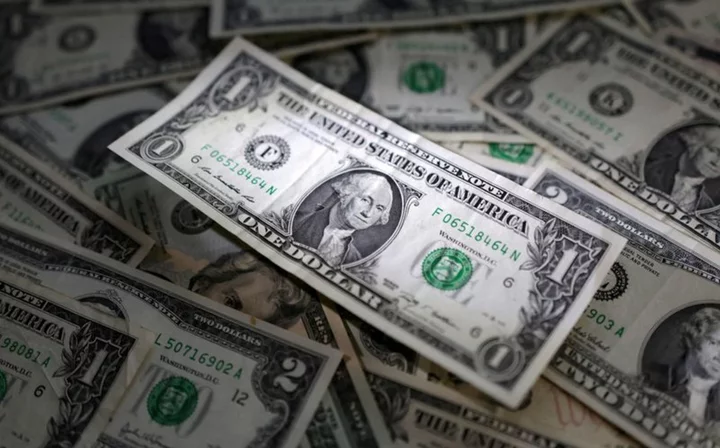The EU's top internet enforcer took to X, the rebranded Twitter, on Wednesday to trumpet a rival platform, as a duel with Elon Musk over disinformation ratcheted up.
Thierry Breton, the European Union's commissioner for industry and the digital economy, joined the Bluesky network in a move designed to further rile Musk, who is fighting to keep X relevant but out of Brussels' regulatory sights.
It came a day after Breton warned Musk that X was spreading "illegal content and disinformation" in relation to the conflict between Israel and Hamas.
Breton pointed out that X was now being held to account under a new EU law, the Digital Services Act (DSA), which carries penalties of up to six percent of global turnover if a big online platform is found in breach of rules on moderating content.
On Wednesday, Breton posted on X that "even though the grass is not (always) greener on the other side, the sky is sometimes… bluer".
In case anybody missed the allusion to Bluesky, Breton also posted his new Bluesky profile on his X feed, giving his Bluesky handle and a bio description of "EU Commissioner. Digital enforcer. Father."
Over on Bluesky -- a rapidly-growing US platform led by former Twitter executives -- Breton so far has posted just once: a copy of the letter he sent to Musk giving the X owner 24 hours to respond with details on what he is doing to curb disinformation.
The move by Breton is a public challenge to Musk, who is sensitive to references on his platform to the competitors that are syphoning off X/Twitter users upset with the direction the billionaire is taking his platform.
- 'Open and transparent' -
For a time, Musk -- a self-described free-speech "absolutist" -- even had X block links pointing users to on open-source rival Mastodon.
And he has started legal action against Threads, a new alternative launched by Facebook parent Meta that is not available in Europe because of wariness over the EU's regulatory oversight.
Bluesky, yet another microblogging platform, is tiny so far compared to X because access is invitation-only from existing users, preventing bots, spammers and propaganda operatives from creating thousands of fake accounts.
Yet its board members include Jack Dorsey, Twitter's co-founder, and users say their experience with Bluesky thus far is that it has little of the trolling, spam and disinformation encountered on X or other social media.
In a public reply to Breton's warning over disinformation related to the Israel/Hamas conflict, Musk posted on X that the platform's policy was that "everything was open source and transparent, an approach that I know the EU supports".
He asked the EU commissioner to "please list the violations you allude to on X", signing off "merci beaucoup" in a nod to Breton's French nationality.
Breton responded on X that it was up to Musk to "demonstrate that you walk the talk" and said his team was standing by to "enforce rigorously" DSA compliance.
Breton does not decide himself what constitutes illegal online content -- that is defined by EU laws or legislation in EU member countries -- but he plays an active role in putting attention on platforms.
- 'New sheriff' -
The commissioner has hailed the EU rules he helped bring in as an effort to tame the online "Wild West".
In a post on X last year, he said: "A new sheriff is in town -- and it goes by the name DSA."
Since Musk bought Twitter in 2022 he has brought in changes that include firing many staff who had handled content moderation, allowing back figures such as former US president Donald Trump, who had been banned for inflammatory posts, and of course changing the platform's name to X.
X also left an EU voluntary code of practice on fighting disinformation and misinformation which served as a pointer towards the sort of scrutiny now imposed under the mandatory DSA.
Another EU commissioner, Vera Jourova, last month said that an analysis in three EU countries showed X had the biggest proportion of disinformation compared to other big platforms.
Advertisers have stepped back from X, causing its revenues to plummet. Several celebrities and newsmakers, too, have left.
Since Hamas militants stormed Israel's border area around the Gaza enclave on the weekend, big online platforms have been flooded with videos showing gruesome deaths, hostages and bombardments.
On X, the authenticity and veracity of many of the posts are difficult to determine because the platform has replaced its blue-tick verification system with one where any user can simply buy in.
In several posts, images from unrelated areas and incidents have been falsely presented as occurring during the Hamas raids or conflict with Israel.
And since last week, X has ceased giving links to news articles that are posted, replacing them with an image only that gives no context or description.
International news agency Agence France-Presse (AFP) has announced that it is taking legal action against X in France to enforce EU law relating to payments for use of online content.
aro-rmb/dc/yad









